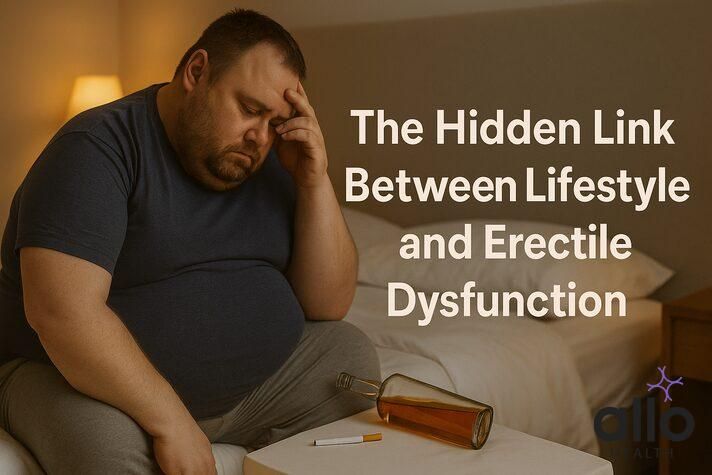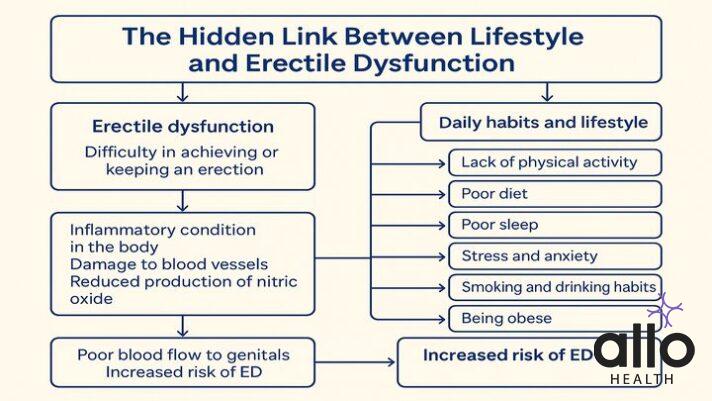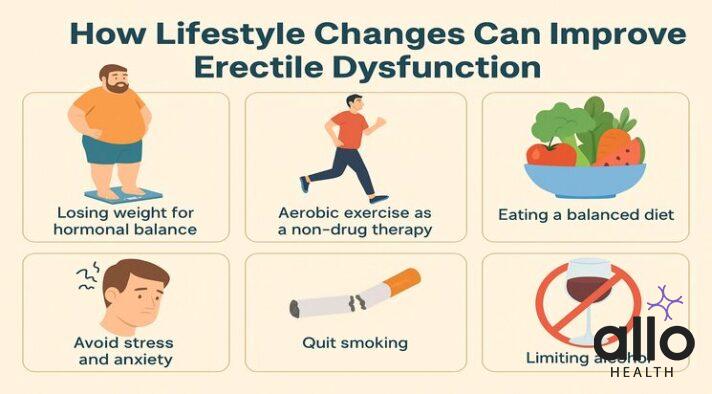Top 7 Effective Erectile Dysfunction Lifestyle Changes
Written by Dr. Anvi Dogra

Dr. Anvi Dogra is a dentist by training who has carved a niche as a medical writer, SEO content strategist, and healthcare marketing consultant. With hands-on experience across sectors like pharmaceuticals, nutraceuticals, medical tourism, digital health, and wellness, she brings a 360-degree understanding of the healthcare industry to her work. Over the years, Dr. Anvi has created SEO-optimized medical content, brand messaging, and marketing strategies for a wide range of clients—including hospitals, healthcare startups, wellness brands, and individual medical practitioners. Her ability to translate complex medical topics into accessible, engaging, and search-friendly content makes her a trusted name in the space. In addition to her work in writing and marketing, Dr. Anvi has also worked as a non-clinical career consultant, helping doctors and medical graduates navigate alternative career paths in health tech, medical communications, and digital health marketing. Her own journey from clinical dentistry to content strategy allows her to mentor others with empathy and real-world insights.
•
May 24, 2025
Our experts continually monitor the health and wellness space, and we update our articles when new information becomes available.

Quick Read
Erectile dysfunction (ED) can often be improved by making healthy lifestyle changes. Factors like being overweight, eating an unhealthy diet, not exercising, smoking, drinking too much alcohol, poor sleep, and high stress levels can all increase the risk of ED by harming blood flow, hormone balance, and nerve function. Simple changes such as losing weight, doing regular aerobic exercise, eating a balanced diet like the Mediterranean diet, quitting smoking, cutting down on alcohol, managing stress through counseling, and getting enough quality sleep can make a big difference. While these changes may not cure ED completely, they can greatly support sexual health and overall well-being.
If you have been searching for “erectile dysfunction lifestyle changes,” chances are you are looking for day-to-day changes that can help you in either improving or curing erectile dysfunction. In cases of mild or moderate erectile dysfunction, incorporating some changes into lifestyle can play a major role. These lifestyle changes may include a balanced diet, an active lifestyle, losing weight, overcoming stress, and quitting smoking and drinking. But let us be clear, while these changes can make a noticeable difference, they are not a cure for ED. This article will guide you about.
- What is the importance of lifestyle changes for ED?
- What changes do you need to make in your daily life?
- When to seek professional help?
The Hidden Link Between Lifestyle and Erectile Dysfunction
Erectile dysfunction is one of the most common sex problems, affecting millions of men. It is characterized by difficulty in achieving or keeping an erection that is good enough for sexual intercourse[1]. ED can be caused by a lot of reasons, which may involve physical, anatomical, and psychological factors. Major causes of ED include lack of blood supply to the genitals, nerve damage, hormonal imbalances, stress, and some metabolic conditions (diabetes, cardiovascular diseases, high blood pressure, and metabolic syndrome) [1]. Besides these causes, your daily habits and lifestyle can be a risk factor for causing erectile dysfunction. These habits may include [2]:
- Lack of physical activity
- Poor diet
- Poor sleep
- Stress and anxiety
- Smoking and drinking habits
- Being obese
Now you might be thinking, how can these habits pose a risk for ED? These risk factors can create an inflammatory condition in the body. This inflammation damages blood vessels, affects heart health, and reduces the body’s ability to produce nitric oxide (NO). Nitric oxide is necessary for healthy blood flow to the genitals, including the penis [2]. Poor blood flow to the genitals means an increased risk of ED.

How Lifestyle Changes Can Improve Erectile Dysfunction?
Luckily, not all men with ED require medical intervention. Some of them can see the results by improving their lifestyle. Let us dive into knowing some lifestyle changes that help in supporting your sexual health: Losing weight for hormonal balance: Being obese and overweight can lead to hormonal disturbances in men. Research has shown that there is low testosterone production in obese men [2]. A study from the US conducted on 31,724 men shows that there is a 40% risk of ED in obese men [2]. Therefore, losing weight can play an important role in preventing ED in men. Aerobic exercise as a non-drug therapy: Aerobic exercise for 30 minutes a day has been shown to reduce the risk of cardiovascular diseases and blood pressure and promote nitric oxide production [3]. All of these factors are essential for healthy erections. Regular exercising can also be used as a non-pharmacological therapy for the men suffering from mild and moderate ED [3]. Eating a balanced diet : A lot of diseases and conditions depend on the food and diet we consume. A Mediterranean diet rich in fruits, vegetables, whole grains, legumes, and healthy fats has been linked to a lower risk of erectile dysfunction. A balanced diet supports blood circulation, improves insulin sensitivity, and promotes nitric oxide production. In a study that focused on men for 2 years, it was concluded that the men who followed a Mediterranean diet saw an improvement in ED when compared with men who did not. The diet of men who saw improvement in ED included fruits, vegetables, nuts, whole grains, and olive oil. [2] Avoid stress and anxiety: Your body produces a hormone called cortisol during stress. Cortisol can lower sexual desire and make it difficult to attain an erection. Counseling and getting help through therapy can help you in managing stress and avoiding the risk of ED. [3]. Quit smoking: There is a strong association between smoking and ED. The number of cigarettes smoked is directly proportional to the severity of ED [4]. A study focused on 40-70-year-old men found that smoking alone doubled the chance of erectile dysfunction [4]. Quitting smoking is one of the most important steps to improve sexual health. Limiting alcohol: Erectile dysfunction is commonly seen in men with alcohol dependence [5]. The relation between alcohol and erectile dysfunction depends upon the dosage and amount of alcohol consumed [5]. Alcohol can affect the central nervous system, including the hypothalamus and anterior pituitary gland, causing testosterone disturbances and damaging blood vessels and nerves [6]. Besides affecting sexual health, alcohol is also responsible for causing marital disharmony [5]. That is why reducing your alcohol intake may improve your sex life in a better way.

Are Erectile Dysfunction Lifestyle Changes Enough to Cure ED?
Lifestyle changes can play a major role in improving erectile dysfunction, especially when it’s caused by factors like poor diet, lack of exercise, stress, smoking, or being overweight. In mild to moderate cases, adopting healthier habits: like exercising regularly, eating a balanced diet, sleeping well, and managing stress can lead to improvement in erectile function. However, it’s important to understand that lifestyle changes may not be enough to completely cure ED in all cases. Sometimes, ED is a symptom of an underlying health condition such as diabetes, high blood pressure, cardiovascular disease, or hormonal imbalances [7]. These conditions often require medical evaluation and targeted treatment beyond just lifestyle improvements. Also, ED can have psychological roots, such as anxiety, depression, or relationship issues, which may need counseling or therapy. If your symptoms continue despite making healthy changes, it’s a sign to consult a healthcare professional. They can help identify the root cause and recommend the right treatment options. To conclude, lifestyle changes may help with ED, but the best results come from combining them with medical interventions. Conclusion Lifestyle changes can help in improving your overall well-being and sexual health. Habits like eating a balanced diet, following an active lifestyle, losing weight, overcoming stress, and quitting smoking and drinking can not only help with ED but also help with better quality of life. But if the symptoms of ED are persistent even after making all these changes, you should consult a healthcare professional. In such cases, ED can be a signal of some deeper health issues. Therefore, a balanced approach of combining lifestyle changes and medical interventions is the best practice for erectile dysfunction.
Disclaimer
The following blog article discusses alternative medicine practices and their potential effects or benefits. However, it is important to note that the information provided is for general educational purposes only and should not be considered as medical advice or a substitute for professional guidance from a qualified healthcare professional. Before considering any alternative medicine practices or treatments, it is recommended to consult with a healthcare professional. Alternative medicine encompasses a wide range of practices that may not have undergone rigorous scientific evaluation or received widespread acceptance within the medical community. The effectiveness, safety, and appropriateness of alternative medicine practices can vary significantly depending on the individual, their specific medical conditions, and other factors. It is important to approach alternative medicine practices with caution and skepticism. Some practices may carry potential risks or interact with existing medical treatments. A healthcare professional can provide guidance based on your medical history, evaluate the available evidence, and offer informed advice regarding the potential benefits and risks of alternative medicine practices. Individuals with specific medical conditions, allergies, or taking medications should exercise particular caution when considering alternative medicine practices. Some practices may have contraindications or adverse effects, and it is essential to discuss these potential concerns with a healthcare professional before pursuing any alternative treatments.
Most Asked Questions
Can lifestyle changes fix erectile dysfunction?
In many cases—especially mild to moderate ED—lifestyle changes can significantly improve or even reverse symptoms. Improvements in diet, regular exercise, weight loss, quitting smoking, better sleep, and managing stress are often enough to restore healthy sexual function, particularly when no serious underlying medical condition is present.
Can a man live with erectile dysfunction?
Yes, but it often impacts self-esteem, relationships, and quality of life. Many men live with ED silently, but support, counseling, and appropriate treatment—ranging from lifestyle changes to medical therapies—can help most men regain confidence and sexual function.
Is erectile dysfunction permanent?
ED is not always permanent. It depends on the cause. When related to lifestyle factors, stress, or temporary health issues, ED is often reversible. However, if caused by irreversible nerve damage or advanced medical conditions, it may require ongoing treatment.
Is there a simple trick to cure ED?
There is no one-size-fits-all “trick,” but regular aerobic exercise, quitting smoking, losing excess weight, and managing stress have been shown to improve erections significantly. These changes act like “simple but powerful” interventions when practiced consistently.
Is there a permanent cure for erectile dysfunction?
There is no universal permanent cure, but many men experience long-term reversal of symptoms through consistent lifestyle changes or medical interventions like hormone therapy or surgery. The key is identifying the underlying cause and addressing it directly.
Sources
- 1.
Erectile Dysfunction (ED): Urology Care Foundation
- 2.
Lifestyle modifications and erectile dysfunction: what can be expected?: Asian Journal of Andrology
- 3.
Effect of aerobic exercise on erectile function: systematic review and meta-analysis of randomized controlled trials: The Journal Of Sexual Medicine
- 4.
Smoking and erectile dysfunction: findings from a representative sample of Australian men: BMJ Journals
- 5.
Prevalence and correlates of sexual dysfunction in male patients with alcohol dependence syndrome: Indian Journal Of Psychiatry
- 6.
Alcohol’s Effects on Male Reproduction:NIH
- 7.
Erectile dysfunction (impotence): NHS
Why Should You Trust Us?
Why Should You Trust Us?
This article was written by Dr. Anvi Dogra, who has more than 3 years of experience in the healthcare industry.
Allo has the expertise of over 50+ doctors who have treated more than 1.5 lakh patients both online and offline across 30+ clinics.
Our mission is to provide reliable, accurate, and practical health information to help you make informed decisions.
For This Article
- We reviewed over 10 high-authority sources, including Harvard Health, Cleveland Clinic, NHS, and peer-reviewed journals, to ensure all facts are grounded in medical science.
- We included concerns and experiences shared by real men on forums like Reddit, Quora, and Practo to make the content relatable and practically useful.
- Our article doesn't oversell lifestyle changes as a miracle cure. Instead, it offers a realistic view, blending prevention, natural support, and when to seek medical help.
- We break down complex medical information into easy-to-understand, actionable steps for men looking to improve their condition naturally and sustainably.
